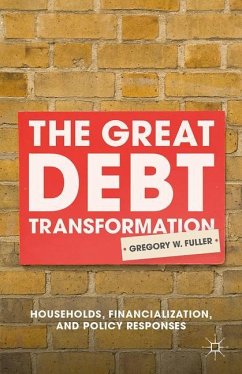Global financial markets have transformed over the past three decades - with potentially dangerous results. Growing competitiveness in financial markets has forced banks to adapt - by merging, growing, and innovating. The result has been an unprecedented transformation in the identity of society's borrowers: households and banks are borrowing more, businesses are borrowing relatively less. This "Great Debt Transformation" has profound consequences: as we shift toward economic growth fueled by consumption and financial investment, instability, indebtedness, and inequality have all risen. This book explains this transformation, why it matters, what caused it, and - most importantly - examines how some countries have restrained the transformation underway. Britain, France, and Germany have taken very different approaches to this transformation - and those approaches have resulted in divergent results. This book aims to turn those different results into lessons to help us make sense of the great economic challenges of our time.
Bitte wählen Sie Ihr Anliegen aus.
Rechnungen
Retourenschein anfordern
Bestellstatus
Storno








